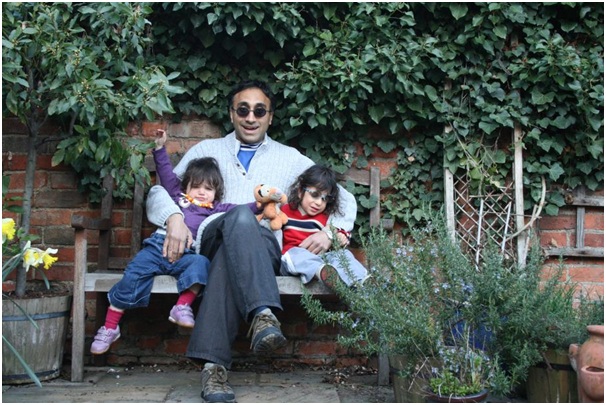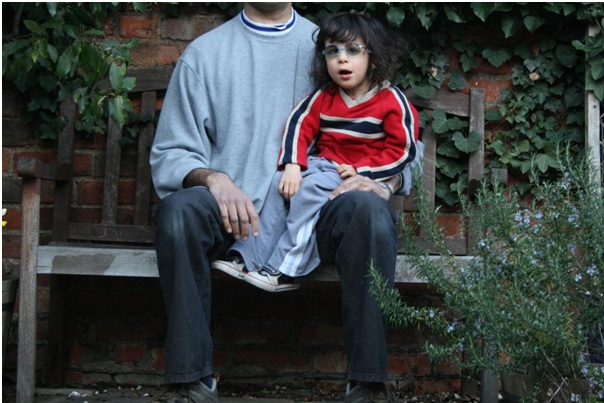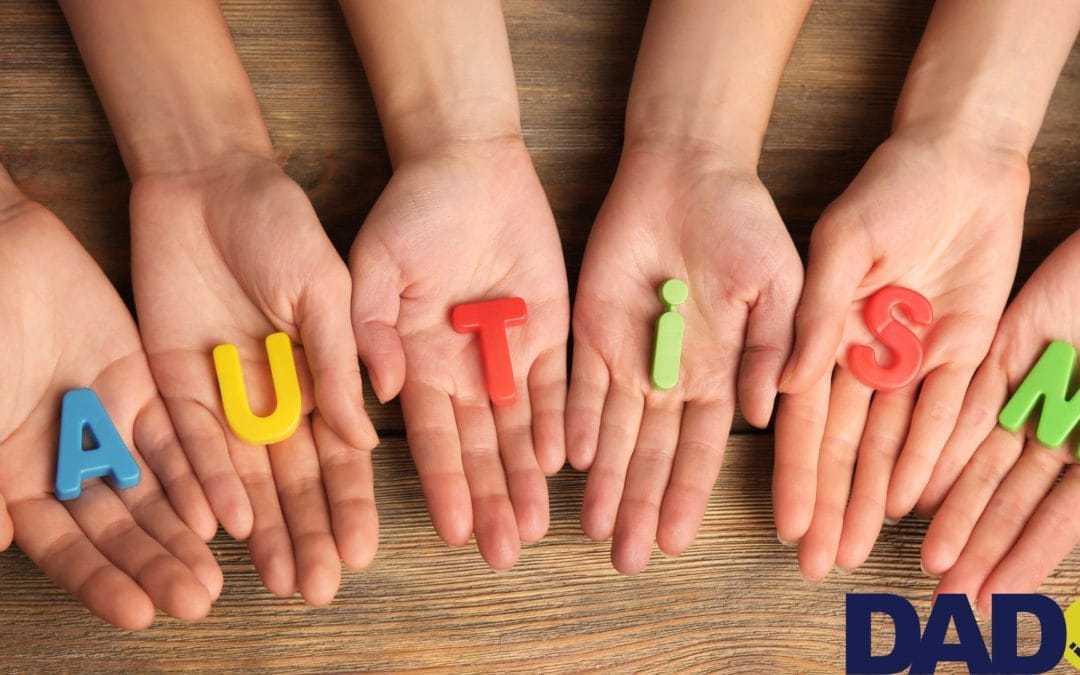
In his blog Mrunal shares the highs and lows of his life with his son Arun, who has cerebral palsy and autism, his younger daughter Meri, the mischief maker and last but no means least, his wife Clare.
Here are a few excerpts from his blogs that he has been writing for DAD.
Fatherhood in intensive care
My twin boys were born very prematurely at 24 weeks of gestation. Arun spent six months in hospital before coming home. Rohan never made it home, he died after nine weeks.
When the boys were in hospital, I spent a lot of time there. More than this, I spent as much time as I could there. In between working and eating, I think I spent pretty much every waking moment there.
This made me think about the levels of engagement that different men had shown in the plight of their children and got me thinking: Why were some Dads just not there?
Some men had demanding jobs where their employer was less sympathetic than my own and so simply could not spend hours at the hospital. Others may have been there in the hours that I was not. Other fathers undoubtedly had other children to look after whilst mother was tending to baby in hospital. Even so, I found it difficult to understand why they did not swap places sometimes.
Beyond these, I think, there are more deep seated psychological reasons why some men were absent. Mothers and babies bond instinctively. Fathers, however, need to work on getting to know their babies and some of them need to learn to love them. However, I suspect that some fathers just didn’t want to hang around the hospital and cluck over their child.
From my own experience there are two more sinister reasons why men were sometimes absent.
To put it simply, the first reason was that we were scared. An intensive care unit is a frightening place. There were numerous times when a small part of me wanted to be somewhere else, anywhere else where I did not have to face the stark reality of what was happening to my children.
Even darker though is the shame that I suspect some fathers felt at having a child in intensive care. Men are supposed to be strong. Our job is to further our genes by fathering strong children. To my own shame, there was one fleeting moment when I realised that a part of me had not completely accepted the children as my own. It only was when I saw my own name against the incubators that I truly felt ownership of the twins. It was only then that the tiny sliver of denial was exposed and finally expunged. I imagine that I was not alone in feeling this.
I can’t and I won’t judge those who were not present. I can only speculate as to why some fathers chose to be absent when their children were in hospital. Men, despite the press to the contrary, are complex creatures. Every father who chose to be there had their reasons and had to battle their own demons. I suspect every father that was absent had to do the same.
One small step for man, one giant leap for Arun
Put out the bunting. Ring the church bells. Book the Red Arrows for a fly by. Today has been a truly momentous day. Bigger than the moon landing, bigger than the Royal Wedding, bigger than the final of Strictly. Arun, my disabled son, took his first unaided steps!
Arun’s dad
Everyone knows that disability is difficult and that living with disability changes your life. However, what I didn’t know was that how much having a disabled child would change not just my life but also my whole being. I am a different person because I am the father of a disabled child and I like to think that I am a better person for it.
The economics of disability
Arun is already a burden on the state. The medical and education services he calls upon cost thousands of pounds a month. When he was in intensive care in hospital, I was told that his bed cost £8,000 a night. Going forward, it isn’t going to get any cheaper. It is entirely possible, even probable, that he will continue to need expensive help for the rest of his life. The flip side of this is that the taxes he will earn are unlikely to ever pay the Exchequer back. So why should we pay for citizens like Arun?
Because they are our babies.
Old and new friends
A couple of weeks back we had some hospital appointments with Arun in London. As we were in the building we popped into the neo-natal unit in University College Hospital where he was born so prematurely and spent six months in intensive care.
Within moments word got round that Arun was back in the building and we were swamped by a sea of happy faces all of whom were delighted to see the tiny baby they had nursed, now growing up into a happy little toddler. As he was hugged, kissed and swirled around by the hospital staff it gave me cause to reflect on all the people I have met on my journey as Arun’s father and the impact that they have had on my life.
No heroes
I went for coffee recently with a couple of Mums whose children are also disabled. As we were chatting, our conversation turned to the recent spate of documentaries on television about disabled children and their families. We talked about how the experiences that were shown were all horribly familiar. In fact, I have stopped watching such documentaries because frankly I don’t learn anything new from them. However, we got talking about a common theme in them: namely, the bravery of the families concerned. We all looked at each other a little bewildered because none of us felt remotely brave or courageous.
The realities of living with a disability
Recently, a number of prominent disability charities reported an increase in public abuse towards disabled people and their families.
My four year old son, Arun, and the life he leads is a case in point. Everyone notices the obvious things like the problems that Arun has walking and the fact that he goes to a special school. However, the cynics would protest- he does walk and he does talk, so how disabled can he be?
Boys will be boys
 As we passed a particularly wet patch of sand, Arun decided that it merited further investigation. He toddled unsteadily towards it. A huge smile broke out onto his face as soon as he reached it. At first he bent down to touch the sopping wet sand. Before I knew it, he had plonked himself down in it and was splashing away.
As we passed a particularly wet patch of sand, Arun decided that it merited further investigation. He toddled unsteadily towards it. A huge smile broke out onto his face as soon as he reached it. At first he bent down to touch the sopping wet sand. Before I knew it, he had plonked himself down in it and was splashing away.
Meri, watched him from a safe distance, being careful not to get her pretty dress dirty. Arun, on the other hand was filthy. His hands, feet, bottom, stomach and face were covered in muddy sand and he was loving every minute of it.
I turned to Clare proudly. “It’s wonderful,I said, “He’s turning into a proper little boy.” Because of Arun’s cerebral palsy, we were never sure that Arun would enjoy days like this. It wasn’t just the obvious things like him being able to walk on the beach. It was also the more subtle things like touching wet or sticky sand – up until recently Arun would recoil at such challenging sensations.
And, as for that stream in the garden of the cottage? I was wrong. Two days later, Arun fell into it. Not only did he fall into it, but he found the muddiest part of it to fall into. And when he discovered that it barely came over his ankles, he sat down in it to ensure he got as dirty as he possibly could. I just stood laughing because, at the end of the day, boys will be boys.
Progress
“Come and look at this,” I called to Clare.
She came into the lounge from the kitchen. Arun was sitting on the sofa, holding a small bell and as we watched he rang the bell and then held it up to his face.
“Hello,” he said. A stern look passed over his face. “OK,” he continued. “Bye,” he concluded.
Clare mirrored my expression and grinned from ear to ear. “He’s talking on the phone – imaginative play,” she said.
On the face of it, this is nothing remarkable. Except that this is one of the first times that Arun has done this sort of thing. Arun has autism and one common trait with autists is that they don’t have very active imaginations.
So, to see him pretending that a bell was a phone and actually pretending to talk to someone (I think it was his Granny) was great to see.
Schooling
My little boy is growing up. In February Arun will be five years old and this means we need to start thinking about full time schooling for him. I suspect that most parents think hard about the right school for their children and Arun is no different. However, because of his disabilities the decisions we have to make are very different.
A cure for autism
Just then another voice piped up from the back seat, “Give Mummy a stroke.”
Arun leant forward in his toddler seat and stroked Clare’s hair in the seat in front of him. “Don’t worry Mummy. It will be OK.”
He looked at me, “Don’t worry Daddy,” he said shaking his head, “It’s OK” Looking at his sister in the seat next to him, “Don’t worry Meri, it’s OK.”
Clare and I looked at each other and laughed. My disabled son’s intervention had broken the tension in the car.
“That’s amazing,” Clare said and she was right.
What was remarkable was not that a five year old had picked up on the decaying mood in the car and had re-assured us but that an autistic five year old had done it.
Updated: Oct 2017







